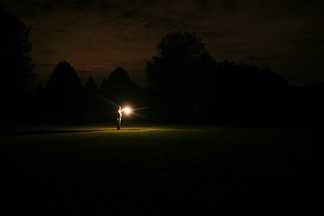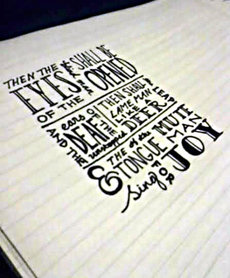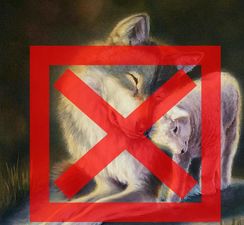 “The people who walked in darkness have seen a great light. Those who lived in a land of deep darkness – on them light has shined.” Not every claim the Bible makes can be immediately verified, but you can pretty easily verify that there is deep darkness in the world. The stories and videos that have come out of Aleppo this month, the frightening divisions that only seem to be growing in our own country, violence on the streets and at schools and in homes, the whole communications phenomenon that is going by the name “post-truth,” telling us that "all news is fake," "facts don’t matter," and you can say anything if it helps you get your way…. When we look around our world, darkness is obvious. Now everyone knows that you can get used to darkness. Your eyes adjust. Even if a room is pitch black, you eventually acclimate enough to sort of see what is there, but here’s the catch: you don’t see it in full color. You don’t see it in its truth and its complexity. You just see grey. If at 4am you wake up and feel your way to the chest of drawers and pull out a sweatshirt, you won’t be able to tell whether it’s the orange Fighting Illini shirt you wear to games or the green one you wear around the house. Everything looks more or less the same in the dark.
0 Comments
 “Are you the one who is to come, or are we to look for another?” John the Baptist is one of the Biblical figures most associated with Advent. He’s on the cover of your bulletin this season, for example. He is traditionally described as a fiery, confident, challenging prophet. The four Gospels pretty consistently show him as standing strong in his vocation to point people to the coming Messiah, knowing that when that person appeared on the scene, his job was to say “Behold the Lamb of God!” We hear about John the Baptist’s eating locusts and wild honey, only what could be scavenged to keep him alive, as he spent time in the wilderness. We read of his assertive reproofs of the compromise he saw in religious leaders, and of his bold denunciations of Herod the Great’s abuse of power and abuse of women (like many whistleblowers, that eventually landed him in prison). We read that crowds went out to meet him by the River Jordan, seeking a baptism they hoped would truly be the beginning of a new life. And we read that when a delegation from the nation’s capital turned up at the Jordan to interrogate John as to just who he thought he was, he knew exactly how to reply, quoting the prophet Isaiah: “I am the voice of one crying in the wilderness, prepare the way of the Lord, make his paths straight.” So, they asked him, are you just preparing, then? Are you the one who is to come, or are we to look for another? No, said John, I am not the one who is to come. “One is coming after me, the thong of whose sandals I am not worthy to untie. I baptize you with water for repentance, but the one who is to come will baptize you with the Holy Spirit. His winnowing fork is in his hand; he will gather the good wheat into the granary but the chaff he will burn with unquenchable fire.” We read that just last week.  The wolf shall live with the lamb, the leopard shall lie down with the kid, the calf and the lion and the fatling together, and a little child shall lead them. They will not hurt or destroy on all my holy mountain; for the earth will be full of the knowledge of the Lord as the waters cover the sea. This year all of our Old Testament readings in Advent come from Isaiah, which gives us a chance to encounter some of the world’s great poetry, and today’s reading from Isaiah 11 is no exception. Christians hear this text as pointing to what the Advent season asks us to expect – not merely Christmas, but the fullness of the Kingdom realized in Jesus and in us. I just quoted one of the most famous sections of this famous passage, the section describing a world that has been fully reconciled to God, a world in which ancestral enemies have been set free to collaborate in love, a world in which, as Isaiah puts it, “the wolf shall live with the lamb.” I discovered this week that trying to find a depiction of that phrase, of a wolf and a lamb living in harmony, is an interesting task. An awful lot of visual artists seem to have decided that the only way to make it even seem possible is by depicting the wolf as completely unlike a wolf – you’ll see cute, doe-eyed, fluffy wolves snuggled up with a sweet little lamb. Isaiah dissolved into a Precious Moments mug. Sure, wolves can lie down with lambs -- as long as they aren’t wolves. There’s no actual redemption or reconciling power in that, you’ll note; it essentially treats Isaiah’s text as a touching fantasy. (“Wouldn’t it be nice? If only it could be that way. Sweet, naïve Isaiah. Sweet, naïve Judaism and Christianity. It’ll never happen, but at least it warms the heart to dream about it a few weeks a year.”) |
Archives
July 2024
Categories |

 RSS Feed
RSS Feed